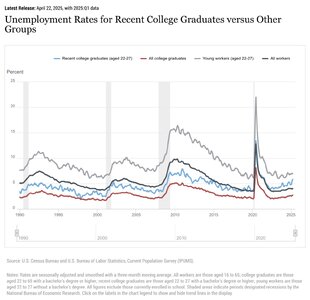Unemployment among young college graduates outpaces overall US joblessness rate
Young people graduating from college this spring and summer are facing one of the toughest job markets in more than a decade.

apnews.com
“… Young people graduating
from college this spring and summer are facing one of the toughest job markets in more than a decade. The unemployment rate for degree holders ages 22 to 27 has reached
its highest level in a dozen years, excluding the coronavirus pandemic. Joblessness among that group is now higher than the overall unemployment rate, and the gap is larger than it has been in more than three decades.
The rise in unemployment has worried many economists as well as officials at the Federal Reserve because it could be an early sign of trouble for the economy. It suggests businesses are
holding off on hiring new workers because of rampant uncertainty stemming from the Trump administration’s tariff increases, which could slow growth.
…
“Young people are bearing the brunt of a lot of economic uncertainty,” Brad Hersbein, senior economist at the Upjohn Institute, a labor-focused think tank, said. “The people that you often are most hesitant in hiring when economic conditions are uncertain are entry-level positions.”
The growth of
artificial intelligence may be playing an additional role by eating away at positions for beginners in white-collar professions such as information technology, finance, and law….”

www.usatoday.com

